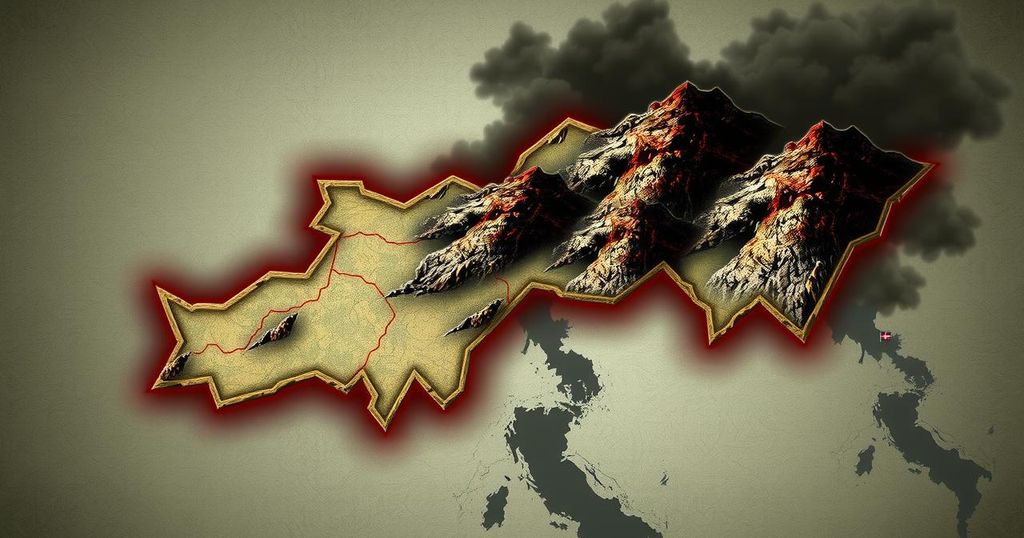The M23 rebel group, backed by Rwandan forces, has launched a significant offensive in eastern DRC, resulting in over 2,900 deaths. Despite a declared ceasefire, clashes continue, particularly in South Kivu province as forces advance towards Bukavu. Regional leaders plan a summit to address the crisis amid growing concerns over escalating violence and its implications for regional stability.
The M23 rebel group, supported by Rwandan forces, has initiated a new offensive in eastern Democratic Republic of Congo (DRC), coinciding with impending diplomatic talks between the Rwandan and Congolese leaders. The recent assault resulted in the substantial loss of life in Goma, with UN estimates indicating over 2,900 fatalities, significantly exceeding previous reports. Despite declaring a ceasefire, M23 forces have continued their military operations by attacking a mining town in South Kivu province, inching closer to the capital, Bukavu.
Intense fighting erupted in Nyabibwe, approximately 100 kilometers from Bukavu, as M23 and Rwandan troops broke their ceasefire agreement. Congolese government spokesperson Patrick Muyaya criticized the M23’s ceasefire declaration as a mere facade, stating that they had no genuine intention of desisting from military objectives. This violation marks yet another instance in a protracted conflict characterized by multiple ceasefires that have been routinely abandoned.
The recent capture of Goma has amplified concerns for the local populace and military observers, indicating a resurgence in aggressive actions from the M23 group amidst a three-decade-long conflict involving numerous militias. Vivian van de Perre of the UN peacekeeping mission reported that an alarming number of bodies were found in Goma streets, with a total of 2,900 casualties confirmed, suggesting ongoing violence may further escalate.
A religious gathering took place in Bukavu, where citizens expressed their desire for peace amidst worsening security conditions. Local women organized prayers to emphasize that they are tiring of continuous warfare. Simultaneously, leaders from the DRC and Rwanda, including President Félix Tshisekedi and President Paul Kagame, are expected to participate in a significant crisis summit in Dar es Salaam, tackling the ongoing turmoil in the region.
Regional and international entities, including the UN and the African Union, are responding cautiously to the escalating violence, yet Congolese officials criticize the lack of tangible measures being taken. DRC’s Foreign Minister Thérèse Kayikwamba Wagner lamented, “We see a lot of declarations but we do not see actions,” capturing the frustration felt by many. Neighboring nations have begun reinforcing their defenses in anticipation of a potential spillover from the conflict.
There are consistent allegations regarding Rwandan troops operating in DRC, with assertions of them aiding M23 for economic gain from the vast mineral resources in the region. Rwanda has consistently denied involvement, countering that DRC harbors armed groups responsible for massacres during the 1994 Rwandan genocide. This complex interplay of conflict is exacerbated by the region’s rich deposits of valuable minerals like coltan and gold, intensifying the struggle for control.
The eastern Democratic Republic of Congo has been embroiled in conflict for over 30 years, involving numerous armed groups including the M23, which is supported by Rwanda. Recent escalations in violence have prompted international attention, with significant casualties reported from battles. The impending diplomatic talks between heads of state reflect the urgent need for resolution, while suspicions of military collaboration and resource exploitation further complicate the situation.
The M23’s renewed offensive in eastern DRC has led to a substantial increase in civilian casualties and heightened fears of an escalating conflict. The diplomatic efforts by regional leaders may pave the way for discussions, yet skepticism remains regarding the efficacy of such initiatives in the face of recurring violence. Urgent measures from the international community are crucial in addressing both the humanitarian crisis and the geopolitical implications of this ongoing conflict.
Original Source: www.theguardian.com






